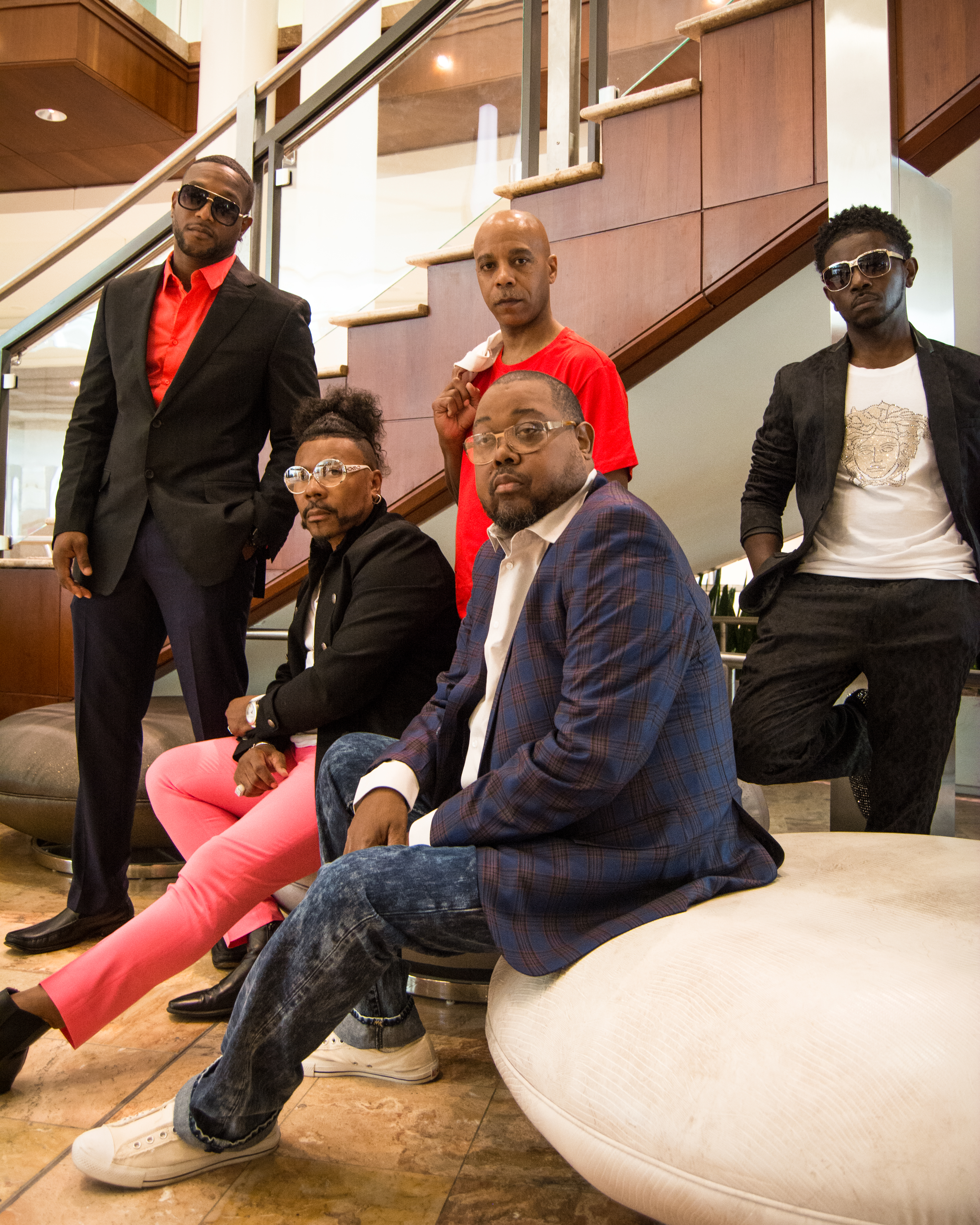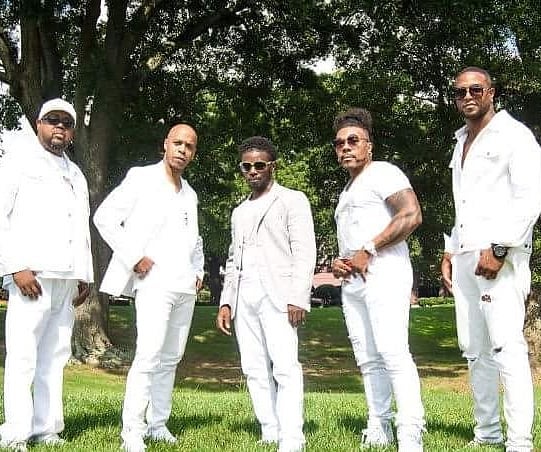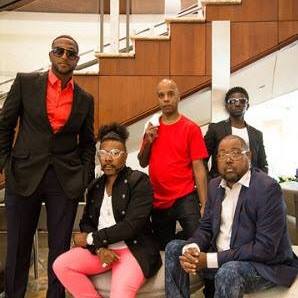Our Conversation with R&B Group Ready For The World on Their Return to Music
The 1980s was a fun and evolving decade for R&B music. It gave us Marvin Gaye’s comeback, Michael Jackson’s peak and Whitney Houston’s start. And while it was a prolific time for solo acts, it was also the post-disco era when groups like Cameo, Zapp and The Gap Band were charting high and charting new territory.
Among those trendsetters was a young band from Flint, Michigan. Ready For The World took over the world with their platinum selling, self-titled debut in 1985, featuring their breakthrough hit “Oh Sheila”.
Thirty-three years later, the band shared with Darnell Meyers-Johnson their strategy for taking over the world, one more time…
DMJ: What’s up, fellas?
BOTH (Willie Triplett & Gordon Strozier): Hey, hey…how you doing? What’s going on?
DMJ: I’m good, man. Thank you guys so much for taking time out to do this. We do appreciate it. Before we get into it, I know I’m only speaking with a couple of you guys so introduce yourselves and remind us what you do in the band.
WT: Sure, my name is Willie Triplett. I play keyboards and percussion.
GS: And I’m Gordon (Strozier). I’m one of the founders of the band and I play multiple instruments, but on stage I play guitar.
DMJ: As I mentioned in the introduction, you guys helped shape the sound of the 80’s. I remember it because I was there for some of it, but for your younger fans who are getting to know you and discovering you for the first time, paint a picture of what that time was like and how it all started.
WT: For me, we grew up in the 70’s and we were pretty much into functioning bands: Earth, Wind & Fire, Cameo, Ohio Players. I mean, you name it. Rick James’ band…
GS: …Parliament.
WT: Because of that upbringing, we, of course, adopted our own instruments. I grew up playing instruments in elementary and high school. The rest of the band members, we met each other competing against one another in talent shows. That music scene at that period was: bands, playing instruments and competition.
GS: You forgot one important element. Pop locking and electric boogaloo. That was in our era too.
DMJ: Oh yeah!
GS: I don’t know if everybody knows, but I’m on dialysis and I was just talking about some of the guys like this group called The Electronics. They used to whoop everybody’s behind. They were older than us, but they went to our high school. I was just joking with them today about how we used to go through the formality of the talent shows, knowing we weren’t going to win, because they were pumping under sheets and doing all this erotic stuff dancing. That was a big thing back then too.
That was the first era of mixtapes and people would start off dancing off of one song like Roger and then they’d go to Prince and then they’d go to Parliament, you know.
I was very gospel influence too through my grandparents. That’s how I really learned how to play a lot of instruments, in church.
DMJ: You mentioned Prince and a lot of your music back in the day seemed Prince inspired. I know you’re from Flint (Michigan), but did any of you have a direct connection to him or anybody in that musical camp?
GS: Greg (Gregory Potts), the keyboard player who wrote the new single “So Much Life”, he went to a show and really got to talk to him and Sly Stone’s old bass player. The one that originated finger plucking and thumping. He’s the Godfather of that on the bass…Larry Graham!
DMJ: There have been a lot of sexual themes in your music, even in the stuff you guys did after the 80’s. Back when you started the whole music censorship movement started to rise as well. When you think back on that particular issue, did you guys ever go too far with your sexier, more sensual material?
WT: I would say, absolutely to an extent. I was maybe 17/18 years old and some of the lyrical content, not only did we have issues getting it played on the radio, but my father wouldn’t allow me to play in clubs. He was pretty upset about some of the lyrics we put into those songs.
GS: Melvin (Riley) wrote the lyrics. Me and him swapped back and forth on instruments back then. I think the lyrics were written about our first sexual encounters with females. “Tonight” we wrote when we were like 15 years old. He might have been 14, I was 15. And we came up with that. It was released after we graduated. But we wrote that when we were like in the 8th or 9th grade. Greg put in chord progressions and all that stuff, but we wrote that when we were very young. That was the first song we ever wrote.
DMJ: Do you have any opinion about the use of explicit language in today’s music? Back in the day, you would hear that mostly in rap/hip-hop, but it seems we hear it more and more in R&B, even with mainstream acts like Toni Braxton and Mariah Carey. Your thoughts?
WT: Two things: It appears the FCC has definitely relaxed their rules as it pertains to that and I also feel to compete and remain competitive you almost have to put a little of that kind of spice into your art. It’s pretty unfortunate because we were just exploring back in the day, now it’s almost mandatory to put that in there to be relevant.
GS: The hardest part about us doing the new song we did, “So Much Life”, was how do we approach it? We’re older now. When we started, we had a young status…16, 17, 18. Now some of us are parents. Some of us will have our first grands. So do you approach it with that kind of secular content? That was the hardest decision. We’re still debating over how we’re going to approach the music when we release the album after this single. At our age, do we play to our age group or do we go younger?
The problem the young people have is they’re really not, how do I say it… Like, when my uncle was younger than us, he used to go out and buy eight albums at a time every payday. Not too many people are doing that now. This is why the record companies are really null and void at this point. The younger generation is not supporting music and the older generation will say, “We want some real music” and then after you do it they’re not supporting it either. How can I figure out which angle to attack this music situation because of that?
DMJ: So what is the game plan for you guys in terms of getting your new music out there and getting people interested in it?
(There was a pause as each gentleman considered his answer.)
WT: Well, of course, we’re going to use the updated sounds (as well as) the mainstay vintage Ready For The World, what we painted into our art previously. And then we will explore the possibilities in terms of lyrical content and that sort of thing.
But I think we need to at least stay vintage Ready For The World.
GS: Also, we might do a couple of club songs for the younger generation, but we’re going to do a lot of live stuff and post a lot of live stuff of us playing like in a jazz setting, just like The Roots did, or Tony Toni Tone and other groups who were playing live instruments.
DMJ: You mentioned the new single is “So Much Life”. Just to confirm or not, is there an album on the way? If so, when will that be out?
WT: Yes, there is an album on the way. We’re looking at spring 2019.
DMJ: You guys are veterans in the game and right now there is a lot of interest in legacy artists. For example, Jeffrey Osborne, Peabo Bryson, Meli’sa Morgan, all have new albums out. Why do you think there is a resurgence of interest in veteran acts?
GS: I think it’s because we formed on real singing and performing live. That’s what we do. Some of these festivals like the Soul Food Festival and the Funk Festival, they have a lot of talent, a whole bunch of live acts. I think it’s a resurgence of that because who wants to go see people standing up playing a track? It’s a resurgence of live instruments, just like there was a resurgence of jazz. At the end it was neo-soul, you know.
WT: But top acts like Bruno Mars, how he incorporates that funk from back in the 70s and 80s into his music of today, that contributes to the desire for that R&B instrumentation.
DMJ: How do you guys feel about acts like Bruno? There’s two different camps. A lot of people love him and what he does and other people say he’s stealing a sound from back in day and is basically a copycat. Your thoughts?
GS: Again, I think it’s a resurgence of that type of music because people have gotten tired of going to concerts and seeing people just perform off of tracks.
Music trends come and go. The only music that really didn’t change in genre is rock & roll. Rock & roll hasn’t changed, but R&B is constantly changing. I mean, when we first started it was live instruments and then I found myself having to put the guitar down because of the new jack swing style. And then Tony Toni Tone came back in and brought live instrumentation back so you could pick up your guitar again. R&B is always moving.
It’s like when Parliament and James Brown played out and then it came back around like when we were 20, from De La Soul and all the rappers who sampled their music.
WT: As far as copycating, I think that’s always been in the music industry. I mean, people accused R. Kelly of copying Aaron Hall and you see where that got him.
GS: Before that was The Gap Band and Stevie Wonder.
CLICK HERE TO READ MORE ABOUT NEW SINGLE “SO MUCH LIFE!”
WT. Right. So, I respect Bruno Mars’ game. If he can take that sound and bring it up to date, I respect that.
DMJ: Since R&B is always changing and the music business is always changing, what is the key to longevity? How do you stay relevant?
WT: Staying true to your art form, being consistent with it. Sometimes, yes, you may not be what’s “in”, you may not be in style, but if you stick true to YOUR art form, it will come back around. Music is cyclical. All of what you did when you weren’t “hot”, people can still appreciate because you stayed true to your game.
GS: We had a bunch of acts here at my house performing and they were younger than us. We were able to do any kind of music they wanted us to do which were the youthful type of things. But lyrically, what they use for words, sentences and phrases is different from when we came up, so I would say you gotta keep younger acts in your production camp. That helps you stay current too.
DMJ: Have you ever been approached by a show like UnSung about telling your story?
GS: Yeah, they asked us to do it for like the last 6 or 7 years, but we refuse to do it because they don’t pay you. It’s basically, you get on here and tell how you got robbed in the industry. Why would I tell somebody my story for free? They call us every year.
Some of our friends in the industry, like Full Force and other groups that came on the road with us or after us, do it and people from UnSung would say, “After you do this show you’ll get more live dates.” But why would you go on television and tell people how you got ripped off, to get ripped off again for free? I mean, they’re getting paid through commercials and everything else so why shouldn’t they at least help the artists financially to tell their story?
DMJ: I understand.
GS: We also wanted to do a movie like New Edition did. We wanted to do that before they even did it. We been talking about that for years. A lot of stuff that happened to us, everybody needs to know. It’s really a learning experience. Again, the music industry is not the same. Like this lady who helps us promote these interviews and stuff, she used to be the head lady of promotions at Universal Records when we were at MCA. (Editorial Note: Through several acquisitions, MCA Records became a part of Universal Music Group which owned Universal Records.)
She said, “I’m the last of the Mohicans. There’s no more record companies. No more promotions. She broke it down to us, which we already felt that way anyway. She works from New York, she was very popular, very powerful, but she broke it down to us and we were so in awe of the names who used to work with her. And she’d say, well they went back to school and they’re nurses or they’re this and that. All those people who did all those promotions back in the 80’s, a lot of them are passed away or they don’t have the power they used to have after the Jews and everybody bought out the radio stations and bought all the record companies out.
It’s a whole different change of events. You have to do more work on the internet, social media, playing music. There’s really no reins on that. Every time we do a video we can just throw it up there and you don’t have anybody blocking it. That’s how you have to approach it now instead of going to the hottest DJ in the market and saying, “Hey, play this record” and if he believes you then everybody else follows you. That’s how we got our deal, but that day, the door has closed on that. Even when people used to walk into BET with their video off of drug money, all that, all those doors are closed.
DMJ: You mentioned an interest in a movie idea. Is that something you’re still trying to make happen or has it been put on the back burner for now?
GS: The person who was supposed to do that for us in our camp, we’re really waiting on him to tell us when. He was supposed to do the screenplay for that.
WT: It could be in the works fairly soon. We’re going to start some things this fall.
DMJ: Before we break out, remind everyone how they can stay updated on everything you’re doing.
WT: Sure. Facebook is just “Ready For The World”. Twitter is @RFTWmusic, which is the same on YouTube. And on Instagram, we are “Ready For The World Official”.
GS: And also on all social media sites we go by our individual names, but I think Greg’s is “Mickey DeepEnd”.
DMJ: Is there anything you’d like to mention that we haven’t touched on?
WT: We’ll be in Los Angeles on October 20, and we appreciate the support.
DMJ: Again, the single is “So Much Life” and the album is coming around the second quarter next year, right?
WT: Second quarter next year.
DMJ: Sounds good. Thank you guys. I appreciate your time.
Both: Alright. Thank you so much.
DMJ: Peace!
Darnell Meyers-Johnson is a New Jersey based music journalist. Previously, he served as creator of The Meyers Music Report on Tumblr.com, Editorial Editor for SoulMusic.com and Entertainment Editor for the now defunct publication Nubian News. Darnell also hosted a weekly radio show, Vocal About Jazz, which streamed online on JazzOn2.org and iTunes.


